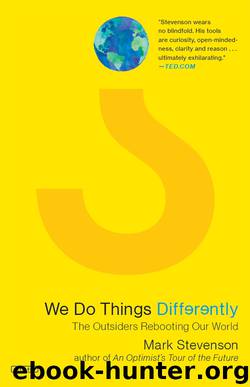We Do Things Differently by Mark Stevenson

Author:Mark Stevenson [STEVENSON, MARK]
Language: eng
Format: epub
Tags: TEC052000, SOC037000, SCI043000, TEC000000
ISBN: 9781468315844
Publisher: The Overlook Press
Published: 2018-01-16T05:00:00+00:00
9 MAKE WAY FOR THE ENERNET
‘To change something, build a new model that makes the existing model obsolete.’
– R. BUCKMINSTER FULLER, ARCHITECT AND SYSTEMS THEORIST
When Samuel Insull kick-started a US energy revolution at the dawn of the twentieth century, his motivations were to take more energy to more people more cheaply, and in doing so he helped put in place a key foundation of a world-dominating USA economy. Insull did this by concentrating power, both physically and economically. Reinhard has proved, at least in Güssing, that he can achieve the same results using a distributed approach where the people own most of the assets. Two models separated by a century with the same ambitions but very different power structures.
There’s a battle coming. In fact, it’s already started.
David Crane, one of the electricity industry’s most outspoken CEOs (he runs NRG Energy, a huge wholesale energy generator with 50,000 megawatts of power generating capacity ‘capable of supporting nearly a third of the US population’), told the Atlantic that a future where communities were much more involved in their own energy generation would be ‘utterly destructive of the utility model that we now have’. When he thinks about competitors, he admits he gives very little thought to the traditional players. ‘Utility executives are usually the antithesis of visionaries,’ he says, which I suspect means he’s not invited to a lot of industry parties. Instead, he believes the energy market will become a ‘free-for-all’. He isn’t alone in his analysis.
A 2014 report by UBS advised the bank’s investment clients ‘solar systems and batteries will be disruptive technologies for the electricity system’ and ‘generation-heavy utilities will be relative losers, as large-scale power stations will hardly fit into the new, decentralised electricity world’. In their hearts the utilities know it too. The Edison Electric Institute, the association representing all the privately owned electric utilities in the USA, has concluded that an emergence of distributed energy technologies (in particular solar) will be largely responsible for ‘declining utility revenues, increasing costs, and lower profitability potential’, drawing comparisons with how the emergence of mobile phones spelled a decline in revenues for fixed line telephony. Perhaps this is why the Institute is lobbying for home solar owners to pay extra levies for their grid connection, now that they are energy suppliers – and investing millions each year in anti-solar PR.
Let’s be clear here. The incumbents are looking at potential economic carnage, and they don’t like it.
Understanding the fight to control Güssing’s heating grid has helped me grasp a wider truth: that the key battleground in energy is not generating capacity (important though that is), but access to energy markets. While Güssing was able to win the battle when it came to heat distribution, it still has to play by the existing rules when it comes to electricity. The town remains dependent on the Austrian Power Grid – the privately owned (but state regulated) distribution system for the entire nation. Energy that isn’t used immediately or stored must be sold to the local utility company.
Download
This site does not store any files on its server. We only index and link to content provided by other sites. Please contact the content providers to delete copyright contents if any and email us, we'll remove relevant links or contents immediately.
| Anthropology | Archaeology |
| Philosophy | Politics & Government |
| Social Sciences | Sociology |
| Women's Studies |
Cecilia; Or, Memoirs of an Heiress — Volume 1 by Fanny Burney(32549)
Cecilia; Or, Memoirs of an Heiress — Volume 2 by Fanny Burney(31947)
Cecilia; Or, Memoirs of an Heiress — Volume 3 by Fanny Burney(31932)
The Great Music City by Andrea Baker(31917)
We're Going to Need More Wine by Gabrielle Union(19035)
All the Missing Girls by Megan Miranda(15962)
Pimp by Iceberg Slim(14489)
Bombshells: Glamour Girls of a Lifetime by Sullivan Steve(14058)
For the Love of Europe by Rick Steves(13946)
Talking to Strangers by Malcolm Gladwell(13350)
Norse Mythology by Gaiman Neil(13349)
Fifty Shades Freed by E L James(13233)
Mindhunter: Inside the FBI's Elite Serial Crime Unit by John E. Douglas & Mark Olshaker(9324)
Crazy Rich Asians by Kevin Kwan(9280)
The Lost Art of Listening by Michael P. Nichols(7494)
Enlightenment Now: The Case for Reason, Science, Humanism, and Progress by Steven Pinker(7306)
The Four Agreements by Don Miguel Ruiz(6745)
Bad Blood by John Carreyrou(6612)
Weapons of Math Destruction by Cathy O'Neil(6267)
